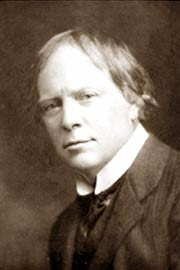

The family may not have been wealthy but from an early age Machen found riches in the beauty, history and myths of his birthplace, later writing: “I shall always esteem it as the greatest piece of fortune that has fallen to me, that I was born in that noble, fallen Caerleon-on-Usk, in the heart of Gwent.” Why? Because that “little silent, deserted village” of Caerleon “was once the golden Isca of the Roman legions is golden for ever and immortal in the romances of King Arthur and the Graal and the Round Table”.

‘Machen’, his mother’s maiden name, was added to the surname to satisfy a condition for receiving a bequest from one of her relatives. Machen (pronounced to rhyme with ‘bracken’ rather than ‘taken’) was born Arthur Llewelyn Jones in 1863, in the small town of Caerleon-on-Usk, South Wales, the son of an Anglican clergyman. But, unlike some of his ornately structured stories, let’s begin at the beginning. In the intervening years Machen was an actor, a journalist, a dabbler in the occult, a cult figure himself, and the inadvertent creator of a bona fide legend. (c1908) Arthur Machen: Ecstasy and Sin in AmershamĪ face glimpsed at a window fills the observer with terror an unearthly femme fatale triggers a slew of suicides among society men a dissolute youth takes medicine that has stewed too long on a chemist’s shelves and dissolves into seething black goo! These are just some of the plot elements that made Arthur Machen briefly notorious as an author of the 1890s’ ‘Decadent’ movement in literature – but that was all long before he came to live in Amersham in 1929. Arthur Machen, author of ‘the greatest horror story


 0 kommentar(er)
0 kommentar(er)
